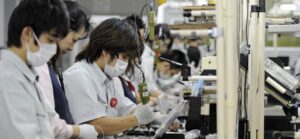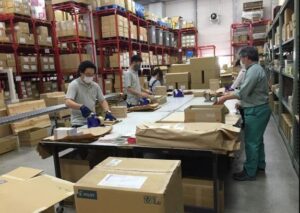Jobs in Japan 2022:
Are you searching for a job in Japan? If you are, read on to find the best jobs in Japan 2022. There are numerous jobs in Japan, ranging from FACTORY WORKER to WAREHOUSE KEEPER. Here are some of the most popular jobs in Japan, including FACTORY WORKER and WAREHOUSE KEEPER. These jobs are the best in Japan because they are highly paid, give a good salary, and have many perks.

FACTORY WORKER:
For many people, working as a factory worker in Japan is a dream come true. The country is home to more than 190,000 factories, and the variety of industries is vast. You can take advantage of this by studying the country’s labor market and locating your skills. Read on for a few tips and tricks to get started in a factory in Japan. After all, you’re not going to work in a factory if you don’t like it.

Most factory jobs require no formal education and pay well. In some busy areas, part-time factory workers can earn 900 to 1000 yen per hour. However, wages can vary greatly based on the province in which you live. For example, part-time factory workers must put in at least 28 hours per week. For those with sufficient experience, salary will be much higher. The best part about factory jobs is that they don’t require any formal education.
WAREHOUSE KEEPER:
In Japan, a WAREHOUSE KEEPER can expect to earn around 174,000 JPY per month on average. This is almost 47% higher than the average salary for High School graduates. The average salary of a Store Keeper in Japan is also based on gender; male employees earn about 5% more than their female counterparts. The future outlook for this profession in Japan is very bright.

GENERAL LABOR:
Considering the recent increase in the number of foreigners in Japan, there are likely a lot of GENERAL LABOR jobs to be had in the country by 2022. Many people assume that blue collar jobs in Japan are only for white-collar workers, but this is simply not the case. These jobs can range from stacking shelves in convenience stores to working on construction sites or even cleaning up radioactive debris at Fukushima. In Japan, however, the general work force consists of blue collar jobs.

Many people are not aware of the fact that manual laborers in Japan do not get work visas. In fact, they typically enter the country as “technical intern trainees” or “foreign students” – visas that are only valid for five years. While this may not seem like much of a big deal, it’s important to realize that the Japanese government has long avoided admitting to immigration because of their acute labor shortage. In reality, though, the number of manual laborers in Japan has doubled over the past five years.
CLEANER:
If you’re looking for a job in Japan, consider a CLEANER job. This indoor position is highly rewarding and is popular among expats. You’ll be responsible for cleaning rooms and replacing beds. The average salary for a Cleaner Job in Japan is 175,000 JPY per month, and half of those employed in this industry earn less than this. This wide range in pay means you should aim for the higher end of the salary spectrum.

The best way to land this job is to start by brushing up on your Japanese. If you’re not fluent in the language, it’s not too difficult to learn the basics. Learn some basic phrases in Nihongo, and you’ll be well on your way. If you’re going to be cleaning public buildings, it’s important to have good English and a solid knowledge of the language.
DRIVER:
If you are a passionate driver, there are several opportunities for you to start a career in Japan. There are many advantages of driving in Japan. Depending on your skill level, you could become an official car driver for the Embassy of Japan. The embassy offers a good working environment, paid vacation, and sick leave. Working hours are from 9:00 am to 12:30 pm and 2:00 pm to 5:30 pm from Monday to Friday, with occasional weekend events.

